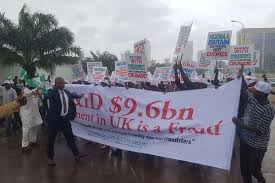Federal Government of Nigeria has won a an appeal in a London Court to over turn an earlier judgement that awarded $11 billion to Process & Industrial Developments, P&ID as damages over a failed gas contract that was never excused. The federal government hailed the landmark victory after it won its bid to overturn the $11 billion damages bill for a collapsed gas project, in a case a judge at London’s High Court said exemplified the ravages of greed and corruption. Nigeria had previously been ordered to pay the sum – representing around a third of its foreign exchange reserves – to Process & Industrial Developments (P&ID), a company based in the British Virgin Islands.
But Judge Robin Knowles found that P&ID had paid bribes to a Nigerian oil ministry official in connection with the gas contract signed in 2010, and had failed to disclose this when it later took Nigeria to arbitration over the collapse of the deal. Reacting to the London Court judgement President Bola Tinubu said the judgment showed “nation states will no longer be held hostage by economic conspiracies between private firms and solitarily corrupt officials”. It is a victory for our long exploited continent and for the developing world at large, which has for too long been on the receiving end of unjust economic malpractice and overt exploitation”. P&ID had taken Nigeria to arbitration in London after its 20-year gas supply and processing contract to construct and operate a gas processing plant in southern Nigeria had fallen apart.
In 2017, it was awarded $6.6 billion for lost profits – a sum which had swelled with interest to over $11 billion, representing 10 times the country’s 2019 health budget. However, Nigeria’s lawyers went to court in London to overturn the award, saying P&ID had bribed senior officials to obtain the contract and corrupted the country’s lawyers to obtain confidential documents during the arbitration. P&ID denied Nigeria’s allegations, blaming the failure of the gas deal and the country’s arbitration defeat on Nigerian institutional incompetence, but Knowles allowed Nigeria’s challenge on Monday. The judge wrote that the case had “brought together a combination of examples of what some individuals will do for money”.
“Driven by greed and prepared to use corruption; giving no thought to what their enrichment would mean in terms of harm for others,” he wrote, referring to the loss to the Nigerian people. The judge said a further hearing would take place to decide whether to send the case back to arbitration or ditch the $11 billion award without further delay. Lawyers representing P&ID did not immediately respond to a request for comment. Campaign group Spotlight on Corruption said it was difficult to overstate the importance of the ruling for the Nigerian people, “given the economic prospects of an entire country have been held hostage by a tainted arbitral award that was built on bribes and lies”. Knowles found P&ID had paid bribes to Grace Taiga, formerly legal director at Nigeria’s Ministry of Petroleum Resources and who had died since the end of the trial, before and after the deal was signed and around the time of the arbitration.
He also found that P&ID’s co-founder Michael Quinn, who died in 2015, dishonestly failed to tell the original arbitration panel about the bribes paid to Taiga. Knowles ruled that the arbitration “would have been completely different, and in ways strongly favourable to Nigeria, had the fact of bribery of Mrs Grace Taiga when the (gas contract) was being made been before the tribunal”.

